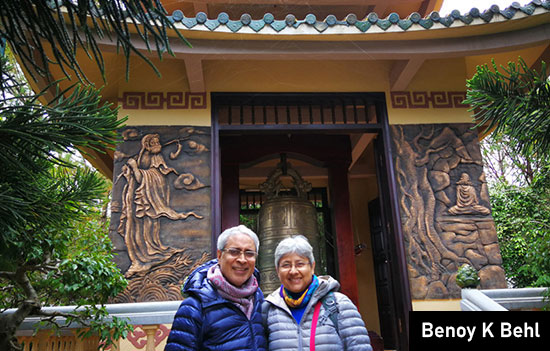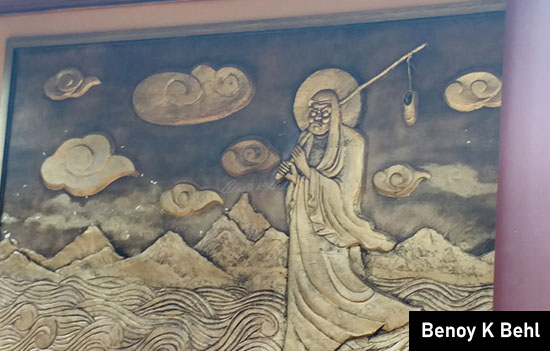- Released
in 2011 the Tamil movie 7Aum Arivu is about a Chinese agent who brings pandemic to Chennai and how a descendant of Bodhidharma overcomes the agent.
- Also briefly, why China dislikes India & how India can deal with China.
Starting
March 2020 India suffered due to the Wuhan Virus. Today there are numerous
media reports about a surge in Covid cases in China. Earlier Prof Shashibala,
an Indic scholar, had written How
Indian Sages controlled epidemics in China earlier . On reading the
article an old and good Chennai based friend recalled seeing a Tamil movie in
2011 titled 7Aum Arivu (meaning
Seventh Sense) which was about a virus sent from China to Chennai.
He wrote, “The movie is a mixture of fact and fiction. While history will bear out the Bodhidharma story, what is interesting is how the Director foresaw spread of virus from China and the havoc a pandemic can cause, that too in 2011. Truth is indeed stranger than fiction.”
Did the film makers have a seventh
sense or premonition in 2011 of things to come in 2020?
My
friend was nice enough to write a short summary of the story (jogged his memory
by referring to this article
in Rediff.com).
“Aravind (played by Suriya) is a descendant of Bodhidharma, a monk prince and who lived in the 5th century and belonged to the Pallava dynasty. Bodhidharma travelled to China at his Guru's request to cure the local population of a pandemic. Highly skilled in martial arts, he trained monks of the Shaolin monastery, thereby creating the base for martial arts in Shaolin Temple.
China sent
an agent to Chennai to create trouble for India from within. He injected a
street dog with virus and this spread like a pandemic. Sudha, a student of
genetics, was working to trace the DNA of Bodhidharma and meets Aravind.
How Aravind draws on his hidden powers of Bodhidharma and kills the
agent and the entire covert operation is the rest of the story.”
To see
movie click Here Wish it is
released with sub-titles or in Hindi. With repeated Chinese incursions in
Ladakh or Arunachal the movie theme, even though fiction, would resonate with
the people of India.
This
movie is one more example of how South Indian movies are way ahead of Bollywood
in stories and handling of Indic concepts.
 Benoy K Behl and Sujata Chatterji at a shrine dedicated to Bodhidharma at Da Lat, Vietnam.
Benoy K Behl and Sujata Chatterji at a shrine dedicated to Bodhidharma at Da Lat, Vietnam.
Who was Bodhidharma?
 Mural of Bodhidharma in above temple in Vietnam.
Mural of Bodhidharma in above temple in Vietnam.
Prof
Shashibala wrote, “Bodhidharma, an Indian monk from Kanchipuram, transmitted the philosophy of Dhyana, which became popular in China as Ch’an and in Japan as Zen.” Read Indology
in China He visited China in the second quarter of the 6th
century A.D. 1 Pg 612.
According to The Cultural Heritage of India, “Bodhidharma’s association with Tamil speaking Kanchipuram is confirmed by Japanese form of his name: Bod-daruma, shortened to Daruma. The Japanese name Daruma goes back to an ancient popular name of the master.” 2 Pg. 898 To read more on Bodhidharma
see Pg 17 of PDF published by the Ramakrishna Mission’s Institute of Culture.
Researcher and associate of historian Benoy K Behl Sujata Chatterji wrote, “The history of Bodhidharma's travel to China has been shrouded in darkness. A breakthrough in revealing this history came when Behl and Sujata Chatterji found a temple dedicated to Bodhidharma in Da Lat, Vietnam. Subsequent research showed that there are numerous shrines to Bodhidharma in Vietnam, where he is deeply revered as Bo-de-dat-ma. Buddhist traditions of Vietnam also believe that the great teacher arrived in Vietnam and went on to China from there. This confirms Behl's finding that traditions in Indonesia and other Buddhist countries state that Bodhidharma took the sea route from India to China, visiting Java and Sumatra on his journey.” To read her full article click on PDF
Sadhguru wrote, “The hill that Bodhidharma resided in after his encounter with the emperor was known as Tai or Chai”. Read Who was
Bodhidharma and Why did he go to China
Also read Scholar
Pilgrims from India to China-Sanskrit on the Silk Route
Why China dislikes India?
Answer
to this question could be a book. Here are some key reasons.
“A successful and democratic India, which rises fast and eliminates its poverty in a reasonable period, is the biggest challenge to the legitimacy of China... The competition between India and China is, therefore, an ideological one”, argued K Subrahmanyam, a noted strategic thinker and author (External Affairs Minister Dr S Jaishankar's father). Source
China is aware of India’s potential and hence wants to “thwart India’s rise to the global high table.” The Chinese are aware of India’s contribution to their civilization hence know India’s unrealized potential.
China
wants Ladakh and Tawang because it probably believes that in the post Dalai
Lama era, the centres of Tibetan Buddhist power would rest in the Himalayan
region.
Also read Learnings
for India from Ladakh Standoff with China And The Geoeconomics of India’s Rise and The
Cultural Heritage of India by Zhu Wenxin
How should India deal with China?
Answer
to this question could be a book. Let me make it simple.
1.
Co-operate and Compete.
2.
Never let your guard down with the Chinese.
3.
India must become an economic and military power.
4.
Let Actions speak, Talk less India and do not rely on signed agreements.
5.
The Chinese hate losing, so they will always return with renewed vigour.
6.
Sooner or later, India has to accept that Tibet is at the heart of India’s problems with China.
Also read How
India should deal with Chinese expansionism
A
big thanks to my Chennai pal for letting me about movie 7Aum Arivu, hence this article.
References
1.
History and Culture of Indian People Volume 3
2.
The Cultural Heritage of India, Volume 7.